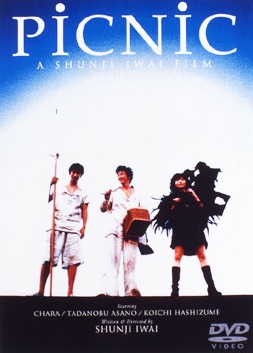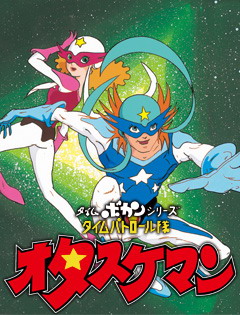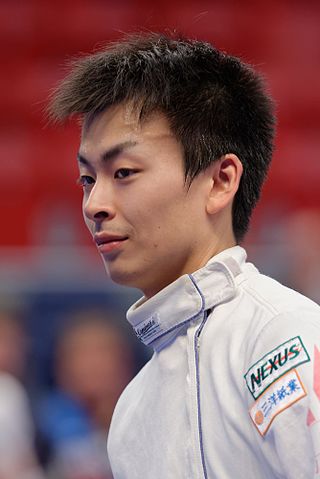Related Research Articles

Kokura is an ancient castle town and the center of Kitakyushu, Japan, guarding the Straits of Shimonoseki between Honshu and Kyushu with its suburb Moji. Kokura is also the name of the penultimate station on the southbound San'yō Shinkansen line, which is owned by JR West. Ferries connect Kokura with Matsuyama on Shikoku, and Busan in South Korea.
Satoru is a Japanese verb meaning "to know" or "understand". It is a common masculine Japanese given name. Satoru is the root of the Zen Buddhist word Satori.
Endless Desire is a 1958 Japanese black comedy and crime film by Shōhei Imamura.

Picnic is a 1996 Japanese film directed by Shunji Iwai. It was released in 1996, with shooting taking place in 1994. The film follows three patients of a mental asylum who misinterpret a passage from the Bible as a sign that the end of the world is imminent, and escape from the walls of the facility to find a place to picnic and watch the event.
Kenji Yamamoto is a Japanese video game musician working for Nintendo, where he is notable for composing music in many titles of the Metroid series, mainly Super Metroid and the Prime trilogy. Yamamoto also plays a role as a music director at Nintendo, overseeing the audio for several of their games. He frequently collaborates with fellow composers Minako Hamano and Masaru Tajima.
Nakajima Planning Co.,Ltd, racing as Nakajima Racing, is a Super Formula and Super GT team organized and founded by Satoru Nakajima in 1983. The team has fielded four championship winners in the Formula Nippon racing series: Tom Coronel, Toranosuke Takagi, Ralph Firman and Loïc Duval. The organization races exclusively in Japan, although the drivers have different nationalities, and competes almost exclusively with Honda or Mugen based cars/engines.
Satoru Kōsaki is a Japanese music composer and arranger. He is best known for his work on anime, including Lucky Star, The Melancholy of Haruhi Suzumiya, Monogatari and Beastars. He worked at Namco, where he primarily composed soundtracks for video games. Since 2005, he has been affiliated with Keiichi Okabe's music production company Monaca, where he has often collaborated with his colleagues to produce soundtracks for anime and other media.

Rescueman, known in Japan as Time Patrol Tai Otasukeman, is the fourth in the Time Bokan series. Burning with ambitions to become the most beautiful woman, the most renowned scientist, and the greatest hero the world has ever known, three villains - Atasha, Sekobitchi, and Duwarusuki - join forces. The trio appear as Time Patrollers, the keepers and protectors of the annals of history. But this is only a cover for the trio, as the villains are in league with a nefarious leader, who is trying to alter the course of history to suit his desires. Under the instructions of their leader, the trio travel in time with the aim of tampering with recorded history. Only Hikaru and Nana, disguised as the Rescuemen, stand between the villains and their goals.

Tomie: Beginning is a 2005 Japanese horror film directed by Ataru Oikawa and the fifth installment of the Tomie film series, serving as a direct prequel to the 1999 film Tomie, with Kenji Mizuhashi reprising his role as Kenichi Yamamoto.

Naoki Yamamoto is a Japanese racing driver for Honda Racing Corporation, currently driving in the Autobacs Super GT Series with Team Kunimitsu, and the Japanese Super Formula Championship with Nakajima Racing. He is a three-time champion in Super Formula, and a two-time champion in the GT500 class of Super GT. Yamamoto is also the only driver to have won both the Super Formula and GT500 championships in the same season multiple times, a feat which he accomplished in 2018 and 2020.
Yukari Yamamoto is a Japanese field hockey player who competed in the 2004 Summer Olympics, the 2008 Summer Olympics and the 2012 Summer Olympics.

Meganebu! is a 2013 anime television series produced by Studio Deen and directed by Soubi Yamamoto, which is based on a series of Drama CDs released by Deen in 2011-2012. The series follows the activities of five male students who belong to their school's Glasses Club and the antics resulting from their shared passion for eyewear. The series premiered on Tokyo MX on October 6 and ended on December 22, 2013.
Uchi no Sanshimai, also known as "My 3 Daughters", is a Japanese manga series written and illustrated by Pretz Matsumoto from October 2005 to April 2011, which later became an anime television series from April 4, 2008, until December 28, 2010.
Satoru Yamamoto was Grand Chamberlain of Japan (1988–1996). He graduated from the University of Tokyo.
Satoru Nakano is a Japanese former swimmer. He competed at the 1964 Summer Olympics and the 1968 Summer Olympics.
Satoru Higashi is a Japanese boxer. He competed at the 1984 Summer Olympics and the 1988 Summer Olympics.
Satoru Terao is a Japanese short track speed skater. He competed at the 1994, 1998, 2002 and the 2010 Winter Olympics.
Satoruvashicoba is a Lightweight Japanese kickboxer who is notable for fighting in the All Japan Kickboxing Federation and K-1. He also has victories over Satoshi Kobayashi and Koji Yoshimoto.

Satoru Uyama is a Japanese right-handed épée fencer, 2016 team Asian champion, and 2021 team Olympic champion.
Watashi wa Shingo is a science fiction manga by Kazuo Umezu. It was serialized in Big Comic Spirits between 1982 and 1986. While best known for his horror manga, Umezu desired to minimize the horror and dedicate Shingo to exploring concepts of god, consciousness, and the metaphysical.
References
- ↑ "Satoru Yamamoto". Olympedia. Retrieved 18 June 2020.